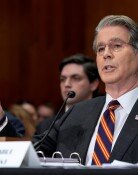[Donga Plaza] Politicians` `principles` are hypocrisy
[Donga Plaza] Politicians` `principles` are hypocrisy
Posted January. 16, 2001 13:20,
![[Donga Plaza] Politicians` `principles` are hypocrisy](https://dimg.donga.com/egc/CDB/ENGLISH/Article/20/01/01/16/2001011683858.jpg)
As for the words they like to use, President Kim Dae-Jung and main opposition Grand National Party (GNP) leader Lee Hoi-Chang are identical. This is especially so at this time when the political circle is as frozen as the winter weather. The two men are claiming "principles" as if they are in chorus.
In a New Year¡¯s press conference, President Kim asserted that he would like to get along well with the opposition party, but there must be some principles to do so. The principles are democracy and the rule of law, he said.
In a series of interviews with newspapers, GNP leader Lee also stressed that for the realization of justifiable causes, principles must be observed and that he would cope with the situations in accordance with those principles.
The two men are confronting each other from the beginning of the New Year and disturbing the people profoundly. For that matter, there is rising discontent among the general public, wondering why they are upsetting the public.
In fact, there is little difference between the principles the two are advocating. They are intending to implement all good things such as democracy, the rule of law, justice, reconciliation, mutual survival and common good. And their objectives are same. There is little disparity in the process to realize the goals between the two leaders. Nonetheless, the two are engaged in a life-or-death struggle.
Because of this, the public is quite confused. What are the real principles these two men are putting forward? Is there anything that cannot be done if the two implement action without fail? Such thinking is very naive. Most people know this. That is to say that with the pretext of their principles, one is attempting to trounce the other and lead politics his own way.
In view of the recent series of the developments, this becomes clear. As for President Kim, despite mounting outcries from the people over the ruling Millennium Democratic Party (MDP)'s unprecedented lending of three lawmakers to the splinter United Liberal Democrats (ULD), he again sent another MDP lawmaker to the ULD and opened the way for the coalition partner to form a floor negotiating group.
And he insisted that the economy would be revitalized if politics stabilized and that the political stability would be achieved if mutual cooperation were well maintained between the MDP and the ULD. Moreover, he accentuated that his government would become that of fearing the people's opinion most.
He also contends that the political instability has been resulted from the GNP's obstructive activities.
It cannot be called democratic politics that do not respect public opinion and transform the popular-mandated legislative structure into a personally favorite format. And this cannot be called the rule of law, as this is far from the spirit of the law. The president, in this manner, is uttering words inconsistent with his favorite words of democracy and the rule of law. Under the circumstances, his pledge to manage state affairs with the people's confidence will be hardly attained, while provoking rising criticism from the public.
As for GNP leader Lee, the festering scandal in which the state intelligence agency's (formerly the Agency for National Security Planning) funds were allegedly funneled into the then ruling New Korea Party, predecessor of the GNP, for the party's election campaign is a serious incident challenging law and justice. It is a case that cannot go undetermined, merely because the GNP president demands the suspension of the investigation.
While the law enforcement authorities are uncovering illegality of misappropriating taxpayers' money for a specific party, the opposition GNP is raising a loud voice demanding the discontinuation of the prosecution's probes, running counter to its favorite call for justice. And even the party is even obstructing the attempts to summon and question the suspects who allegedly collected and distributed the money.
The GNP maintains that party members will not comply with the prosecution's investigation, on the ground that the money in question was a political fund and not from the intelligence agency's budget.
This does make sense at all. Does it mean that it is right to use money that was originally part of the state budget, laundered afterward and distributed to its party members? If not, why has the GNP convoked a special parliamentary session as a means of protecting the suspects of the scandal from their arrest and probes?
Despite this, Lee is paradoxically insisting on the disposition of the case according to the law or principles.
The principles mean basic rules or legal stipulations that should be observed consistently in terms of behavior and logic. In view of the recent remarks made by President Kim and GNP leader Lee, it is doubtful that they really are aware of the true meaning of the word ¡°principle.¡± They seem to forget that the highest principles that the politicians ought to keep are their pursuit of national interests and stability.
It is questionable whether there will be a promising future for the nation, in which the politicians are imposing upon the people the principles worked out by their own standards, instead of those on which the people concur.
Min Byung-Wook, Editorial Writer







